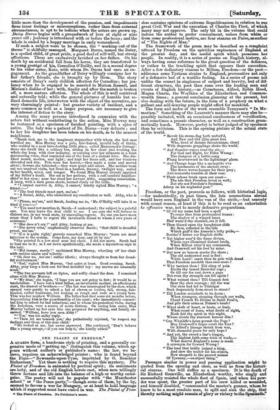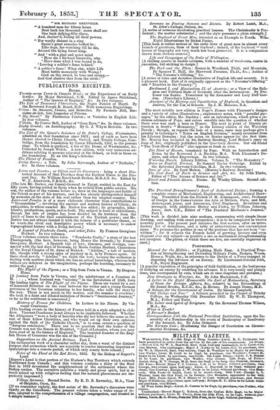TILE PLAJRIT OF FREE1)011. * A QUARTO form, a handsome style
of printing, and a generally ex- pensive mode of " getting up," distinguish. this volume, which sp- ears without author's or publisher's name : the law, we be- e, requires an acknowledged printer ; who• is found beyond the Finis—" Newcastle-upon-Tyne, imprinted by Cl. lonelier Richardson." Yet there is nothing to require this mystery. The Plaint of Freedom is animated by poetical spirit ; its sentiments are lofty, and, of the old English. heroic cast, when men willingly threw fortune. and life into the balance of a.high or worthy enter- • e. The poetry will not be popular with "the .Manchester wheel " or " the Peace- party,"—though some of them, by the by, seemed to favour a war for Hor at least to hold language which. if supported. must have ended in. war. The Plaint of Free- * The Plaint of Freedom. No Fublishafa name. darn contains opinions of extreme Republicanism in relation to our great Civil. War and the execution of Charles the First, of which many may not approve. The only bit in the volume that could induce the author to prefer concealment, unless from whim or from some professional motive, are four stanzas on Paine„ais anther of "The Rights of Man."
The. framework of the poem. may be described as a complaint uttered, by Freedom on the spiritless supineness of England at the present day, and the sordid spirit which possesses her people. In. reality, it is a series of poems on English history, al- ways having some reference to the great question of the defences, or rather to the truckling spirit that opposes their execution. .After a. few dedicatory stanzas to Milton, Freedom—or the poet— addresses some Tyrtsean strains to England, provocative not only of a defensive but of a warlike feeling. In a series of poems not unlike the sonnet in singleness of subject and brevity, but of dif- ferent structure,. the poet then runs over the leading men and events of English history,—as Caraetaous, Alfred, Robin Hood, Magna. Charts, the Worthies of the -Elizabethan and Common- wealth times ; a general conclusion. glancing at the present, but also dealing with the future, in the form of a prophecy on what a gallant and self-denying people might effect for mankind.
The form and metre of the work resemble Tennyson's " In Me- moriam." Something of the Laureate's manner there may also be— possibly imitated, with an occasional carelessness of versification, and sometimes a prosaic character, as well as a construction gram- matically harsh.. However, poetry is better judged of by specimen than by criticism. This is the opening picture of the actual state of the world.
"Revolt his storm-flag hath muffled, And New and Old (like giant foes
Who, tired of distant threatenings, close) With desperate grapplings shake the world. "'And thunder-voices rend the air,— For God and Right, for Elder Wrong : The clangour of a battle-song Flung heavenward in the lightnings' glare. " And Change leaps like a springtide o'er The landmarks of the ancient sway.: The fierce waves hunger for'their prey; And monarchs tremble at their roar. "Their echoes break upon our-coast-
- The isle that Freedom loved so well; But stir not Freedom's Sentinel, Asleep on his neglected post."
Freedom, or the poet, proceeds as follows, with historicar logic, for undoubtedly, in past times, the late commotions abroad would have seen England in the van of the strife,—but warmly with sound reason, at least if this is to be read as an exhortation to offensive war, not to merely defensive preparations.
" Of old my name had been a spell
To rouse thee from profoundest trance : The shadow of a winged lance Had waned' thy slumber, ere it fell.
" Then, blazed upon thy haughtiest cilia
My firm,. reflected. the. tide
Which gulf d the Armada's lofty pride,— Scatter'd before our English skiffs..
" Yet higher soar'd the flame divine,
Whose rays illumined distant lands, When Milton utter'd my commands, And Cromwell set his foot by mine.
" But now no beacon marks thy shore ; The old undaunted soul is fled:
White Land!" must thou be pale with dread
That Freedom needeth thee once more ?
" Why tarriest thou ? Till sting of pain Excite thy tamed Berserkir rage ; Or till our foe cast down a gage Not even thy strength can lift again ?
"What waitest thou? Till Cossack feet Spur thy slow courage; till the war Our sires had led to Trafalgar Back desperately from street to street?
a nu London croucheth to its doom;
When strangers, stepping through our walla, i Chant French Te Deums in Saint Paul'f4 And pile their arms.on Nelson's tomb"?
" What sloth of heart, or brain, or limb, What count of fears, what doubt of right, Math hid thy spirit in this night, Whose clouds thy starriest honour dim?
"Can Wickliffe's heirs permit the Pope ? May Cromwell's lieges court the Tsar? Or Alfred's lineage shrink from war, With shameful peace for only hope ?
" And yet, thy sword a liar's tongue,
Thy highest faith some trick of trade,—
What marvel England's name is made A synonym for Coward Wrong?
"The land that boldly judged a king,.
And slew the traitor for his crimes,. Now stoopeth to the poorest mimes Of Tyranny,—an abject thing."
Passages similar in power and passing application might be quoted from the opening and close, as well as from the histori- cal stanzas. One will suffice as a specimen. It is the death of Sir Richard Grenville an Elizabethan worthy,, who singly and successfully resisted & whole fleet of Spain, and when his pow- der was spent, the greater part of his crew killed or wounded, and himself disabled, " commanded the master's gunner, whom he knew to be a most resolute man, to split and sink the ship, that
thereby nothing might remain of glory or victory to the Spaniards."
" sin IUCHARD GRENVELLE.
" A hundred men for fifteen hours Beat back ten thousand: morn shall see One bark defying fifty-three,
And, shatter'd, foiling all their powers. " For warily distant in a ring Spain's great armadas baffled lie: Like dogs, far-watching till he die, Around the dying forest king..
" And with a glad and quiet mind ' Here-die I Richard Grenville, who Have done what I was bound to do, `Leaving a soldier's fame behind.' " A soldier's fame ! What else, while. Life
Must battle momently with Wrong ? Gird on thy sword, be true and strong,-
And-God absolve thee from the strife !"



























 Previous page
Previous page